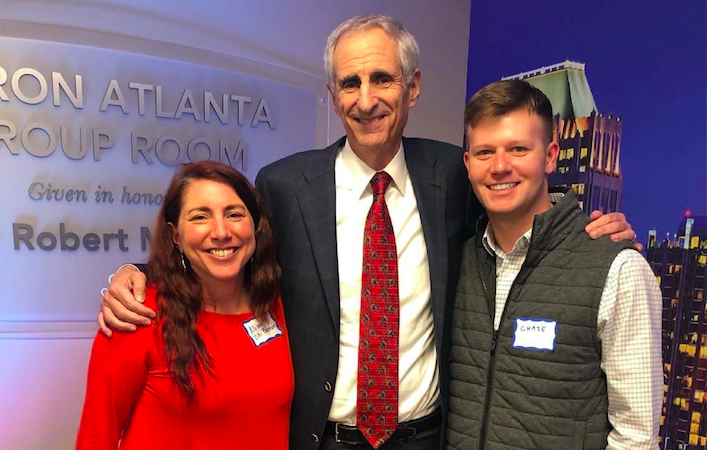Dr. Robert Margolis is one of the greatest leaders I have ever known. My story isn’t unique in regards to his impact. If anything, it exemplifies his character as a person, therapist, and leader in the substance use treatment industry.
34 years ago, God allowed our paths to cross when he was working at Ridgeview in the Action program. I was 8 years old at the time and his impact left me feeling seen, heard, and full of hope. It was at that exact moment I knew, I wanted to be a substance sue therapist, just like him.
Many years later, at the age of 13, when I was in active addition, my parents reached out to him for help. He was patient, kind, and he believed I could get better.
When we had lost all hope, he was there!
There are several more encounters, that I was fortunate enough to have with Dr. Margolis: At 15 years old, when he convinced me to go to treatment for 14 ½ months; At 17 years old, when I got out of treatment and was a client at Solutions; At 22 years old, when I got sober finally and didn’t know who else to turn too; At 24 years old, when I was in graduate school and he hired me to work at Solutions; and At 28 years old, when he allowed me to be Clinical Director at Solutions. All of these moments were equally impactful and ultimately changed the trajectory of my life.
As I’ve been reflecting about my relationships with Bob and his life, I’ve begun to see truly what he has taught me and many others.
Have you ever been humbled by nature?
Have you ever walked through a field of tulips or watched a sunset and been reminded of how incredibly awesome God is and how small you are by comparison?
It’s humbling, isn’t it!
Humility when translated into Hebrew is anavah.
The literal translation of anavah is to occupy your God-given space in the world- not to overestimate yourself or your abilities, and not to underestimate them either.
The value of anavah, or humility, often is described as one of the most important values within the Jewish tradition, particularly for those in positions of leadership.
Humility is a matter of perspective; it is an understanding that our own greatness emerges when we recognize how as individuals fit within the larger community. One who is humble understands the important of placing other’s needs before his own.
Bob’s contributions, talents and gifts were essential to his role within the adolescent addiction community and my life. He truly possessed the quality of anavah and needed no recognition, he aimed for any attention to be drawn away from him and to be more focused on helping adolescents and families impacted by substance use, and he lived without concern of what others thought of him.
As I reflect back on the 34 years of our relationship, I am filled with gratitude, joy, appreciation, and love.
I had the opportunity to speak to Bob a few weeks ago, and if any one else did you know all he wanted to talk about was his unpublished book. I had the privilege of reading this book because he gave me a copy. I’d like to read something from the Introduction: Evidence Plus Experience. In this chapter, Bob talks about three experiences that shaped him as a clinician:
1. When he attended a lecture at Georgia State, put on by NIDA. There was a group of parents there who were up in arms about their children smoking marijuana.
2. When he met with a young man who had gotten sober and talked about what happened. Bob said it wasn’t that he was talking about the 12 steps – it was more about what happened when he came back to share his story with young people on the unit at Ridgeview. This young man’s story was more impactful than anything else they were doing.
3. When he attended a lecture at Ridgeview, given by G. Douglas Talbott, M.D. It was on the disease concept of addiction. Bob wrote, “He emphasizes how the disease effects the thinking and the behavior of the alcoholic…A family therapist described how the disease effects the family.” Bob realized how addiction had impacted his family for generations and that he needed to work on himself.
Bob wrote, “The lecture was major factor in both my professional and personal life. Personally I needed to learn I couldn’t control what others did. I had to shift my focus away from trying to fix the insanity in the family to fixing myself. Professionally, I began to believe that perhaps I would remain in this field; perhaps I could be effective at what I was doing. A year later I moved from the community mental health center to Ridgeview where I was privileged to work with outstanding professionals. I had the opportunity in collaboration with these other professionals to adapt the roadmap that Dr. Talbott had given me to help adolescents.
Over the past forty years I have refined and updated the roadmap as evidence and experience have dictated. For forty years I have continued my work with teens who have alcohol and drug problems. My intent in writing this book is to share this roadmap with others who might want to work with this population. After forty years, I have no regrets about the direction of my life. I have come to the conclusion that this is where I was meant to be”.
Thank you Bob, for always believing in me, our colleagues, the families, and most importantly the young people in recovery. Thank you for pushing us to soar and to see our place in this world.
Allison Basham, LPC


